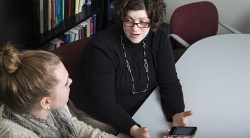
Need to manage multiple medications? There’s an app for that. Does it actually help the user? That’s where Drake comes in. Andrea Kjos, assistant professor of social and administrative sciences in the College of Pharmacy and Health Sciences, and three students are researching diabetic patients’ use of a medication management smartphone application, MedSimple TM.
Named for its purpose, MedSimple TM was designed to help patients easily keep track of and manage their medications. Available for iPhones and Androids, the app is free to download and averages 70–100 downloads per week.
The app features a medication list with each drug’s description and dosage information. The cost savings feature provides coupons and other forms of assistance, and a refill reminder allows the user to set notices for when to pick up his or her new prescription.
Kjos became involved with the app in its conceptual stages in early 2010. The tool was released last fall and Kjos began research in January. She is researching how the mobile tool affects diabetic patients’ behavior, such as how much it is used and whether the technology is helpful for the patient.
Patients are asked behavioral questions at three points in a six-month period: Once when they begin to use the app, again three months later, and then at the end of the six months. The responses will be used to gauge how effective MedSimple TM is and to compare patients’ behavior before and after using the app.
“It will help us figure out the effectiveness of the app and how the tool could be improved,” Kjos says.
If a majority of patients give the app positive feedback, Kjos will consider conducting a more rigorous study comparing behaviors between patients using the technology to those who are not.
Although the app is aligned with the company My Diabetes Home, LLC, patients do not have to be diabetic to use the tool. Anyone with multiple medications or who needs help remembering when to take and refill prescriptions can benefit from the app.
Kjos believes the research will uncover opportunities for two groups in particular. She hopes pharmacy students can be exposed to how technology is developed and integrated as a practical tool for patients. She also believes mobile apps like MedSimple TM have potential to benefit the healthcare industry.
“There’s an app for everything. It seems like healthcare is missing an opportunity if they don’t get involved with this technology,” Kjos says. “We need research right now to make sure the apps are actually helping patients.”
MedSimple’s creator, area endocrinologist Dr. Anuj Bhargava, chose to work with Kjos for her specialty in patient behavior research.
“I think working with the College of Pharmacy and Health Sciences was the right choice,” Bhargava says. “It’s been a very good experience.”
Bhargava’s long-term goals will involve businesses and clinics in the app. The results of Drake’s research will help him complete another goal: to positively influence the lives of as many people as possible.
Already, the app is benefitting three Drake students who are assisting with Kjos’s research: Nicole Quandt, Hayley Vance, and Alexandra Hendzel recruit and contact patients and track information.
Vance, a third-year pharmacy student, said diabetic patients are asked to keep track of a lot of information like blood sugar levels, diet, and medications. She thinks the app will help manage those details and remind patients to refill their medications. And she knows the benefits extend beyond the patients.
“I like that students have the opportunity to be involved with research,” Vance says. “It’s a good way for me to start making connections with doctors and people in the diabetes field.”
-By Gabriella Bedore, public relations major, class of 2013

